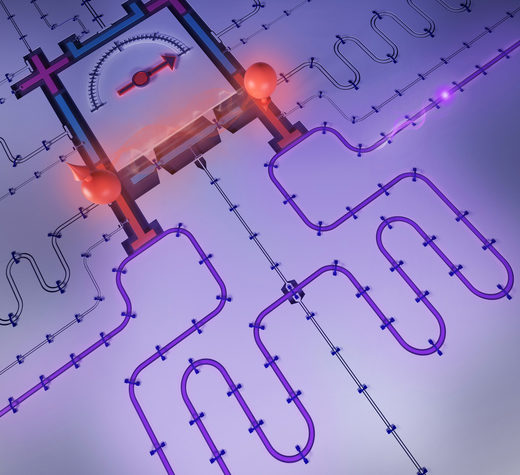As we stand on the precipice of unprecedented advancements in quantum technology, academia and industry are grappling with an essential query: Is Electrical Engineering and Computer Science (EECS) the ultimate combination degree for those aspirants seeking careers in the burgeoning field of quantum mechanics? This inquiry not only invites an exploration of the intricate interdependencies between these two domains but also incites a playful challenge: can adeptness in both high-level theoretical concepts and practical engineering implementations coalesce to forge a new echelon of interdisciplinary expertise?
To delve into this proposition, it is paramount to understand the salient features of EECS. The domain amalgamates the intellectual rigor of electrical engineering, encompassing circuit design, signal processing, and systems theory, with the innovative problem-solving paradigms of computer science, such as algorithm development, computational theory, and software engineering. This confluence of knowledge is particularly salient in quantum computing, where proficient navigation across these disciplines becomes indispensable.
The quantum realm, characterized by its intricate principles such as superposition and entanglement, necessitates a foundational understanding of both the physical laws governing quantum phenomena and the technological mechanisms aimed at harnessing these principles for practical applications. Therefore, does the completion of an EECS degree provide a definitive advantage in this intricate landscape? While passionate debates may ensue, it is prudent to unpack various elements that substantiate the merits of such a dual-focus education.
First and foremost, the theoretical underpinnings of quantum mechanics are essential for any professional operating within quantum domains. EECS programs often incorporate courses in quantum physics, which elucidate the foundational theories requisite for comprehending quantum computers and their operating paradigms. Armed with this theoretical acumen, engineers can pursue challenges related to the design and optimization of quantum circuits and algorithms.
Yet, expertise purely rooted in quantum theory can become insufficient amidst the burgeoning complexities of real-world applications. Herein lies the seamless integration of engineering principles as learners evolve from theorists to practitioners. Through hands-on experience with circuit design and computational modeling, EECS graduates are uniquely positioned to contribute to the implementation of quantum algorithms and error correction techniques, both crucial in addressing ongoing challenges in quantum computing efficacy.
However, one must also consider the critical perspective surrounding the focus on EECS as a potential panacea for aspiring quantum professionals. A singular emphasis on this dual discipline may inadvertently create blind spots regarding other equally vital fields, such as material science, nanotechnology, and cryptography. These disciplines delve into the microscopic intricacies that influence quantum systems, particularly in the development of qubits, the building blocks of quantum computers.
Furthermore, with rapid advancements occurring across multiple scientific arenas, a narrow focus may lead to a renaissance of knowledge silos. The equation thus becomes: can broad interdisciplinary learning truly coexist with the specialization required in quantum technologies? Posing this question amplifies awareness of the diverse skill sets that may be paramount for success in quantum careers.
Collaboration stands out as an essential attribute in the quest for breakthroughs in quantum sciences. A salient facet of EECS education involves team-based projects, fostering skills in collaboration and communication among diverse groups. In the quantum sphere—where physicists, engineers, and computer scientists must convene—effective collaboration can catalyze innovative designs and operational efficiencies. Thus, while the rigorous nature of EECS equips individuals with a robust technical toolkit, the soft skills nurtured throughout the program may prove indispensable in dynamic, multidisciplinary environments.
Similarly, exploring career trajectories reveals that the demands of quantum industries extend beyond the stringent confines of technical knowledge. Positions such as quantum algorithm designers, quantum software developers, and hardware engineers necessitate nuanced comprehensions of quantum computing paradigms, fused with an innovative mindset. Employers, therefore, may not only seek out graduates with solid EECS foundations but also individuals who exhibit adaptability and an eagerness to engage with evolving technologies.
In light of these discussions, it becomes evident that while an EECS degree serves as a valuable framework, it may not singularly furnish all the requisite tools for quantum careers. Interdisciplinary invigoration, pursuing knowledge from complementary fields, and honing collaborative skills are equally essential contenders in sculpting a competent quantum professional. The synthesis of these educational pathways invites learners to embrace curiosity and perpetual growth—traits paramount in the ever-evolving landscape of technology.
To encapsulate this inquiry, one could succinctly debate: Is EECS the ultimate combo degree for quantum careers? Perhaps the query is too reductive. As the quantum landscape expands, a comprehensive toolkit will necessitate more than simply mastering two intersecting fields; it will require a confluence of disciplines, innovative thinking, and a commitment to addressing unforeseen challenges. Ultimately, fostering an open-minded approach to varied scientific domains may prove to be the true essence of success in the realm of quantum endeavors, transcending the definition of what an ideal educational background might entail.












